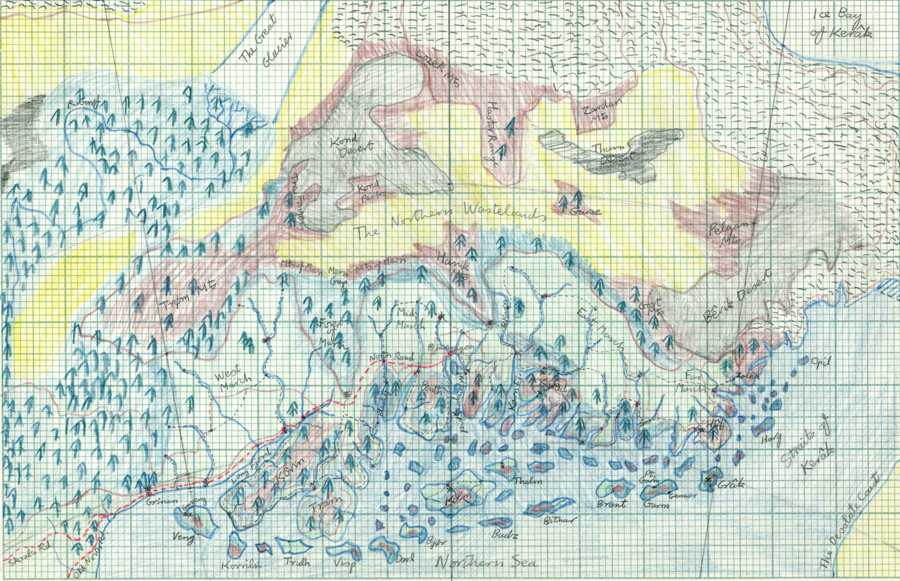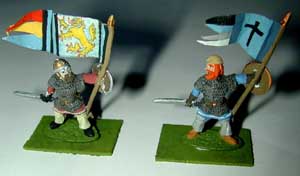

Founded: Kingdom of Bjarmigen founded by Svegn I, in 1085. Kingdom of the North unified by Ulfang Whitebeard in 1820.
Capital: Bjarmigen
Other Major Cities: Karn, Grinen, Torriben, Kolm, Libenth
King: Bjørn XVII, of the House of Bjørn. Acceded to the throne 15 XIII 2500 (aged 27). Born 20 X 2472 (now aged 32). Heir presumptive, daughter Olga (aged 5).
Lord Protector: Harrek Dragonhelm, Duke of Grinen
for Detailed Map follow this link

SCALE: 1 large square = 100 miles / 1 small square = 10 miles
The Kingdom of the North comprises all those lands on the Northern shores of the Great Ocean that lie between the Great Forest of the North-West and the ice-infested Straits of Kerâk. It includes all islands of the Archipelago and stretches inland some three to four hundred miles to the cold deserts and tundra that lie beneath Mt. Koniki and the Ice Mountains. From West to East it measures some thousand miles.
The majority of the population live in and around the numerous fjords of the coast, mostly in small villages. But most of the larger fjords have a larger settlement; usually a port at the head of the fjord, with good lines of communication into the uplands. The largest settlement by far is Bjarmigen; the capital city.
for Population Distribution follow this link
The people of the fjords make a living by fishing and some agriculture. The townspeople are predominantly merchants and traders. In days gone by many coastal tribes were fierce pirates and raiders of other lands, once rivalling even Kyr at such pursuits. The high point of this period was the Sacking of Kuntax.
In the fertile meadows of the uplands agriculture predominates, with most settlements being no bigger than large villages. Sheep farming is the most common, especially in the higher pastures, where it is carried on by isolated farmsteads and shepherds.
The mountains are rich in minerals, and mining is a major industry. The metals are worked by the craftsmen of the towns, whose skills and artistry are thought by many to be unsurpassed amongst humans.
The North Road, from Valdran, runs across the Western half of the Kingdom to Bjarmigen at its centre, and is a major overland trade route.
What with the wealth coming from agriculture, fishing, mining, industry and trade (in about that order), the Kingdom's economy is fairly prosperous. The Kingdom is self-sufficient in basic necessities and exports its surplus in exchange for luxury goods.
The social system is essentially feudal. The feudal system is a series of contracts between King and subject and between subject and subject. The King owns all the land. He grants estates to subjects in return for their entering into certain obligations to him. Typically these will be to manage the estates granted, paying him a proportion of the profits, and to serve in and provide troops for the Royal Army whenever required. In times of peace the King can demand the payment of scutage: a tax in lieu of military service. Subjects may enter into similar arrangements with lesser subjects, and so on down the line. At the bottom are the serfs, who actually work the land. They get the worst deal of all, but still get a fair degree of security and prosperity. The tenure of his land by a commoner might typically be that he holds it from the local Baron, who holds it from an Earl, who holds it from a Duke, who holds it from the King.
But any or all of these links may be missing. In the Marches and Islands there are no Dukes, except for the King in his capacity as Duke of Sveso. The military officers in these areas are not feudal landholders. They are agents of the King. An Earl, Baron or commoner in the Marches or Islands may hold his lands directly from the King, but the military obligations he owes in return are due to the Warden of the March or Lord of the Isles as the King's agent in those matters.
Some land the King does not grant out at all, but retains as personal estates, perhaps with a few serfs on them, such as at Mersin. Bjørn XVI granted his estate at Prasko, on the West coast of Velginfjørd, to Prince Bjørn, thus putting his son in the position of a Baron in relation to this estate.
The landholdings of each feudal lord tend to be concentrated together, rather than parcelled out across the Kingdom. This is partly because the Duchies were historically formed by conquest. Then when the King conquered the independent warlords, they ceded their lands to him in return for his making a feudal grant back to them as Dukes of those same lands. There is also a tradition, for defensive reasons, of granting estates which are all in one place.
The chain of military command rests on these feudal obligations. Levies for the Army are raised by the feudal lord requesting his subject to serve and/or provide men, and so on down the line. Also, since it is every subject's duty to serve his King, there is a royal prerogative to raise troops directly. The feudal obligation of military service can be seen as just a formalisation of this duty. But for the King to levy troops directly in a Duke's estates would be a serious breach of etiquette. He would only do so if the Duke had refused to contribute to his levy, after escheating his lands and before he had appointed a new Duke.
The feudal system can lead to paradox. As a simple example, two people can be each other's feudal lord in respect of two different pieces of land, or a Duke could succeed to a Barony under one of his own Earls. The practice, however, is to avoid such situations, usually by disposing of the awkward lesser estate to a younger son. But a similar situation can occur where nobles hold military offices under the King, when an Earl may outrank a Duke in the chain of command.
Lawmaking is the prerogative of the King, though others may lay down rules within the scope of their authority: for example feudal lords managing their estates, town councils running their towns, or Churches overseeing the spiritual wellbeing of their Faithful. But only the King has the authority to govern the whole of the Kingdom.
To help him with legislation the King summons Parliament. This is a democratic procedure which allows the important people of the land a say in its overall government, but the King always has the final word. The King summons all the lords of the land to a session of Parliament at the New Parliament Buildings in Bjarmigen. (Under the House of Svegn Parliament was held in the White Palace in conjunction with the Church of ESCUS.) Acts of Parliament are made by a majority vote, Barons having 1 vote each, Earls 2, Dukes 4, and the King 8, but the Royal Assent is needed for any Act. Because of duplication of titles, King Bjørn in fact has 12 votes, the Grand Duke of Kôrin and Trarn 8, and the Duke of Hubrael 6. The King may dissolve a Parliament at will, and make legislation by royal prerogative, usually in Council.
To advise him on all matters the King appoints his Privy Council. They convene whenever he is holding Court, and act informally or formally, singly or together. Since the Council is composed of those most trusted by the King, it mostly consists of those holding high office under him.
From 2 I 2501, following the Second Civil War, the Parliament and Privy Council were restructured to give a balance of power between the King's Party and the Church Party, with the King having a casting vote on temporal matters and the Lord Protector having a casting vote on spiritual matters.
The criminal law is largely unwritten, being left to the common law jurisdiction of the various Courts. But the lawmakers can create statutory offences. For example the Statute of Treasons of 2172 declares inter alia that to be of Evil alignment is deemed a constructive treason against the King's government, and is punishable by death without trial. Most crimes are dealt with by capital or corporeal punishment, usually at the discretion of the Court.
Taxation is partly through the system of feudal obligations and partly by the enactment of taxing laws. The distinction is of little practical importance, because the practical effect is that the man at the top decides how much he requires, and takes it. If he goes too far, those below him will revolt, they will be forcibly put down, and everybody loses.
Until the accession of Bjørn I in 2172 the Church of ESCUS was the official State Religion. Bjørn stripped it of this status for siding with his enemies in the First Civil War. But even though it was no longer so influential in affairs of state, the worship of ESCUS remained the most important religion by far in the Kingdom. Also worshipped are SHELDA, BUDIF, KOROS, and SARAN.
Under Kings Bjørn I to XIV the Churches had no direct say in politics. They held their land by grace of the feudal lords. Their income was dependent on offerings, including what they could persuade Parliament to grant to them, and the profits of their land. Some, of course, received financial support from outside the Kingdom. The Ecclesiastical Courts were only allowed a spiritual jurisdiction over their Faithful.
Under the House of Svegn the spiritual jurisdiction of the Church of ESCUS was extensive; being exercised over all subjects irrespective of Faith. It also had considerable temporal power and wealth (and was much more corrupt than it is today). The division of Church and State instituted by the House of Bjørn robbed it of all its temporal power, apart from an honorary place on the Privy Council for the Archbishop of Bjarmigen. All the Churches retain their jurisdiction to marry subjects, but this function is now also possessed by Royal officials. The King always had the prerogative to marry subjects, and the House of Bjørn assert the right to delegate this function.
The Faith of the many ESCUS worshippers, particularly amongst the lower orders, combined with the fiery Northern temperament and a perceived oppression of their religion was a potent combination for unrest, which led to the Second Civil War of the Year 2500, when Harrek Dragonhelm assassinated Bjørn XVI and plunged the Kingdom into a bitter war between the religious and secular factions.
The attack upon Grinen by an invading Evil Army caused the warring factions to join together to defeat the Evils, leading to the Treaty of Bjarmigen of 18 XIII 2500, which provided for power sharing between King Bjørn XVII and Harrek, who was appointed Duke of Grineen and Lord Protector of the North.
Back to top of document
Go to the People page for this territory
Back to Overworld index